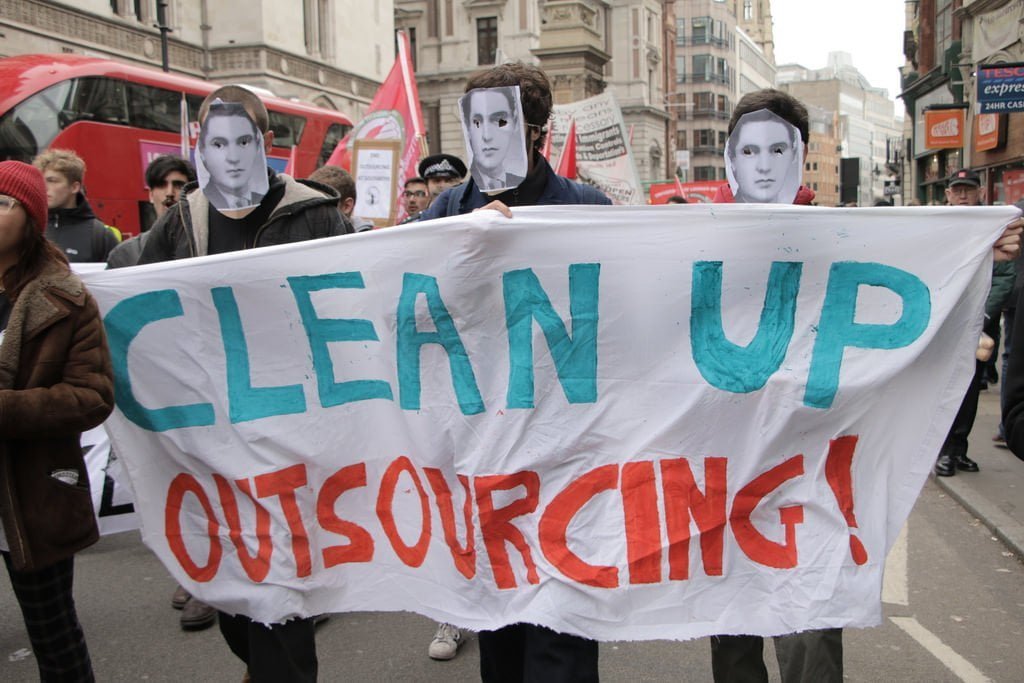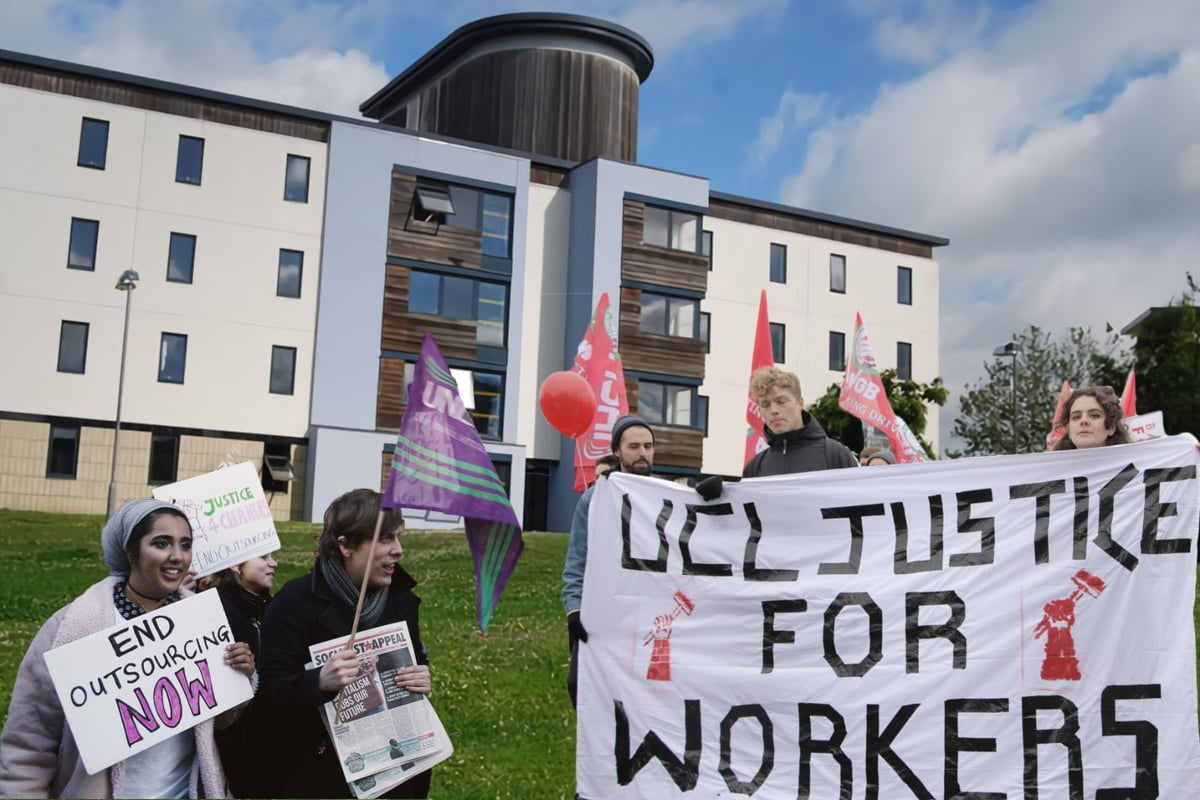The higher education sector has not been immune from the impact of the pandemic. As in other workplaces, university bosses are attempting to make workers pay for this crisis. We must fight to drive out the scourge of outsourcing.
Since the lockdown began, over a month ago, Socialist Appeal has been appealing for workers across Britain to name and shame those bosses who are putting profits before lives.
Particularly shocking have been the number of reports we’ve had from workers and students in higher education. This is a reflection of the effects of marketisation in this sector.
University bosses are engaging in attempts to pass on the costs of the crisis to the most vulnerable workers. Meanwhile, those at the top continue to enjoy their lavish salaries.
As the attempt this week by Sodexo to lay off 30 cleaners from one day to the next shows –
only inhousing will truly protect these workers!
(note the laying off only stopped when it was made public & a campaign started to stop it)
Inhouse them now! https://t.co/QLdklBRLrZ
— UCL-UCU (@UCL_UCU) March 22, 2020
We interviewed one Sodexo cleaner, a member of the IWGB union working at UCL, who explained how the cleaners there are being treated like the dirt they clean.
“Before UCL even closed,” the cleaning worker said, “they sent the students home, and likewise academic staff. But the cleaning staff continue working, facing risks on a daily basis.”
“They said they’d close the university. But while some buildings are closed, workers continue going in as usual. The student residences and laboratories are still open for example…These workers are still going to work and are very anxious and desperate. They are taking risks on a daily basis.
“In the halls of residence, many students have not been able to return home. The buildings have therefore remained open, and cleaners are sent in to work. I heard that some students were even recommending the cleaners go home to avoid taking such useless, avoidable risks, both for the students and for their own sake. Furthermore, Sodexo isn’t providing hand sanitiser or any protection whatsoever.”
Under pressure
This situation is not unique to UCL. We have also been contacted by someone from Goldsmiths, for example – a supposedly ‘left-wing’, ‘radical’ London university. They informed us that the university warden has been pressuring cleaners to come into work on the grounds that they are ‘essential workers’.
Goldsmiths @GoldsmithsUoL @FCorner is still pressuring cleaners into working on campus. The two-tier workforce continues under pandemic! They’ve contacted cleaners informing them they’ve been designated as “essential key workers”. Cleaners have replied demanding to know:
— Justice for Workers [Goldsmiths] (@CleanersFor) March 31, 2020
Cleaners, however, do not feature on the government’s own list of essential roles. Given that there have been confirmed cases of COVID-19 on campus, this pressurising of cleaners is disgusting.
Perhaps the most shocking story we’ve seen has come from the University of Sussex in the form of a leaked email. In their own words, the university’s management plans to reorganise their tutors and other casual staff, with a view to having their contracts “terminated as soon as possible”.
This mass layoff of casual staff has the sole purpose of cutting down the university’s wage bill, while forcing the staff that are kept on to accept even greater workloads in an environment already notorious for overwork.
Race to the bottom
Workers are not robots; and in the face of such attacks by the bosses, casual workers at universities all across the country are seeking to defend themselves. In the words of the IWGB member at UCL:
“We all realise what is happening to us. This has pushed us to join together. Many colleagues are joining the union at the moment. This will allow us to increase the pressure on the university and make them realise that we are all workers and that we’ve given our share of work. Hence, the current mood is to stop all of this, fight, and unite us all in the coming struggle.”
The workers at Goldsmiths have likewise responded to the pressure of the warden by issuing their own demands.
Such stories expose the reality behind for-profit education: it is a race to the bottom in which the only real duty of those running the show is to ensure their spreadsheets look suitably impressive by the end of the year. In normal times, the trend towards marketisation, cost cutting and outsourcing is bad enough. In the current period it becomes a threat to life.
Unite and fight
 The larger trade unions must take up these demands. We have also seen an open letter written by an anonymous UCU rep to the head of the union, Jo Grady, which points the way forward.
The larger trade unions must take up these demands. We have also seen an open letter written by an anonymous UCU rep to the head of the union, Jo Grady, which points the way forward.
Open Letter to Jo Grady and Douglas Chalmers https://t.co/o5FSAPUEAq
— NadiaE is socially isolating (@NadiaE1) April 14, 2020
At this comrades’ institution, UCU and Unison members approached management on behalf of the outsourced and casualised staff. Union members sought assurances that outsourced staff would continue to be paid; and that if the employers ceased paying them, outsourced workers would be brought back in-house.
The comrade went on to make the excellent suggestion that the UCU mobilise those members who are now furloughed, in order to apply pressure on institutions to stand up for casualised staff.
It is an old saying in the trade union movement that “an injury to one is an injury to all”. At no other time has this been more evident than now, when dire working conditions of fellow workers in one part of the country can have direct implications for the health of workers everywhere.
Out of this crisis could emerge the possibility of a united struggle of all workers against the degradation of conditions in all sectors. Such a struggle is the only way to defend higher education from the vultures that now run it.
The fight must be spread to every campus. It is only through united, militant action that we can drive the scourge of outsourcing out of universities and create a truly fit-for-purpose education sector.






